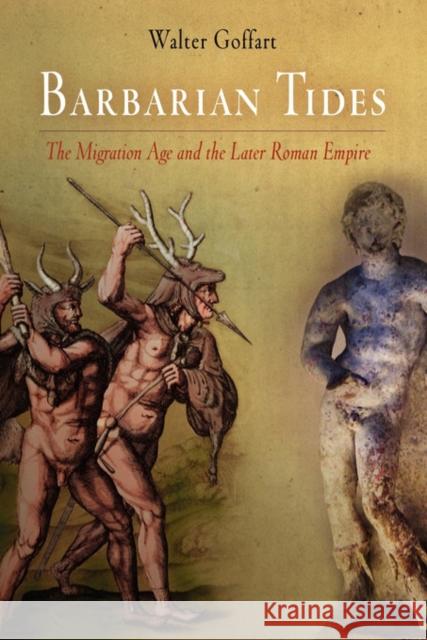Barbarian Tides: The Migration Age and the Later Roman Empire » książka
Barbarian Tides: The Migration Age and the Later Roman Empire
ISBN-13: 9780812221053 / Angielski / Miękka / 2009 / 384 str.
Barbarian Tides The Migration Age and the Later Roman Empire Walter Goffart "Goffart has produced yet another major study on the migration of the Northern barbarians into the late Roman Empire. Although called a sequel to his Barbarians and Romans, this is a completely rethought, significantly expanded and rewritten version."--Choice "An important book which should be read attentively by all scholars of the late Roman West and early medieval Europe, and which will also be instructive to those interested in the intellectual history of early-modern and contemporary European historiography."--EHR The Migration Age is still envisioned as an onrush of expansionary "Germans" pouring unwanted into the Roman Empire and subjecting it to pressures so great that its western parts collapsed under the weight. Further developing the themes set forth in his classic Barbarians and Romans, Walter Goffart dismantles this grand narrative, shaking the barbarians of late antiquity out of this "Germanic" setting and reimagining the role of foreigners in the Later Roman Empire. The Empire was not swamped by a migratory Germanic flood for the simple reason that there was no single ancient Germanic civilization to be transplanted onto ex-Roman soil. Since the sixteenth century, the belief that purposeful Germans existed in parallel with the Romans has been a fixed point in European history. Goffart uncovers the origins of this historical untruth and argues that any projection of a modern Germany out of an ancient one is illusory. Rather, the multiplicity of northern peoples once living on the edges of the Empire participated with the Romans in the larger stirrings of late antiquity. Most relevant among these was the long militarization that gripped late Roman society concurrently with its Christianization. If the fragmented foreign peoples with which the Empire dealt gave Rome an advantage in maintaining its ascendancy, the readiness to admit military talents of any social origin to positions of leadership opened the door of imperial service to immigrants from beyond its frontiers. Many barbarians were settled in the provinces without dislodging the Roman residents or destabilizing landownership; some were even incorporated into the ruling families of the Empire. The outcome of this process, Goffart argues, was a society headed by elites of soldiers and Christian clergy--one we have come to call medieval. Walter Goffart is Professor of History Emeritus at the University of Toronto and Senior Research Scholar and Lecturer at Yale University. The Middle Ages Series 2006 384 pages 6 x 9 ISBN 978-0-8122-3939-3 Cloth $69.95s 45.50 ISBN 978-0-8122-2105-3 Paper $26.50s 17.50 World Rights History Short copy: Barbarian Tides radically subverts the grand narrative of a "Germanic" migration and reinvents the role of barbarians in the Later Roman Empire. Goffart sets out how the fragmented foreign peoples once living on the edges of the Empire participated with the Romans in the larger stirrings of late antiquity.
Barbarian TidesThe Migration Age and the Later Roman EmpireWalter Goffart"Goffart has produced yet another major study on the migration of the Northern barbarians into the late Roman Empire. Although called a sequel to his Barbarians and Romans, this is a completely rethought, significantly expanded and rewritten version."--Choice"An important book which should be read attentively by all scholars of the late Roman West and early medieval Europe, and which will also be instructive to those interested in the intellectual history of early-modern and contemporary European historiography."--EHRThe Migration Age is still envisioned as an onrush of expansionary "Germans" pouring unwanted into the Roman Empire and subjecting it to pressures so great that its western parts collapsed under the weight. Further developing the themes set forth in his classic Barbarians and Romans, Walter Goffart dismantles this grand narrative, shaking the barbarians of late antiquity out of this "Germanic" setting and reimagining the role of foreigners in the Later Roman Empire.The Empire was not swamped by a migratory Germanic flood for the simple reason that there was no single ancient Germanic civilization to be transplanted onto ex-Roman soil. Since the sixteenth century, the belief that purposeful Germans existed in parallel with the Romans has been a fixed point in European history. Goffart uncovers the origins of this historical untruth and argues that any projection of a modern Germany out of an ancient one is illusory. Rather, the multiplicity of northern peoples once living on the edges of the Empire participated with the Romans in the larger stirrings of late antiquity. Most relevant among these was the long militarization that gripped late Roman society concurrently with its Christianization.If the fragmented foreign peoples with which the Empire dealt gave Rome an advantage in maintaining its ascendancy, the readiness to admit military talents of any social origin to positions of leadership opened the door of imperial service to immigrants from beyond its frontiers. Many barbarians were settled in the provinces without dislodging the Roman residents or destabilizing landownership; some were even incorporated into the ruling families of the Empire. The outcome of this process, Goffart argues, was a society headed by elites of soldiers and Christian clergy--one we have come to call medieval.Walter Goffart is Professor of History Emeritus at the University of Toronto and Senior Research Scholar and Lecturer at Yale University.The Middle Ages Series2006 | 384 pages | 6 x 9ISBN 978-0-8122-3939-3 | Cloth | $69.95s | L45.50 ISBN 978-0-8122-2105-3 | Paper | $26.50s | L17.50 World Rights | HistoryShort copy:Barbarian Tides radically subverts the grand narrative of a "Germanic" migration and reinvents the role of barbarians in the Later Roman Empire. Goffart sets out how the fragmented foreign peoples once living on the edges of the Empire participated with the Romans in the larger stirrings of late antiquity.











